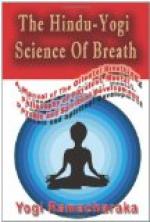THE YOGI COMPLETE BREATH.
Yogi Complete Breathing includes all the good points of High Breathing, Mid Breathing and Low Breathing, with the objectionable features of each eliminated. It brings into play the entire respiratory apparatus, every part of the lungs, every air-cell, every respiratory muscle. The entire respiratory organism responds to this method of breathing, and the maximum amount of benefit is derived from the minimum expenditure of energy. The chest cavity is increased to its normal limits in all directions and every part of the machinery performs its natural work and functions.
One of the most important features of this method of breathing is the fact that the respiratory muscles are fully called into play, whereas in the other forms of breathing only a portion of these muscles are so used. In Complete Breathing, among other muscles, those controlling the ribs are actively used, which increases the space in which the lungs may expand, and also gives the proper support to the organs when needed, Nature availing herself of the perfection of the principle of leverage in this process. Certain muscles hold the lower ribs firmly in position, while other muscles bend them outward.
Then again, in this method, the diaphragm is under perfect control and is able to perform its functions properly, and in such manner as to yield the maximum degree of service.
In the rib-action, above alluded to, the lower ribs are controlled by the diaphragm which draws them slightly downward, while other muscles hold them in place and the intercostal muscles force them outward, which combined action increases the mid-chest cavity to its maximum. In addition to this muscular action, the upper ribs are also lifted and forced outward by the intercostal muscles, which increases the capacity of the upper chest to its fullest extent.
If you have studied the special features of the four given methods of breathing, you will at once see that the Complete Breath comprises all the advantageous features of the three other methods, plus the reciprocal advantages accruing from the combined action of the high-chest, mid-chest, and diaphragmatic regions, and the normal rhythm thus obtained.




